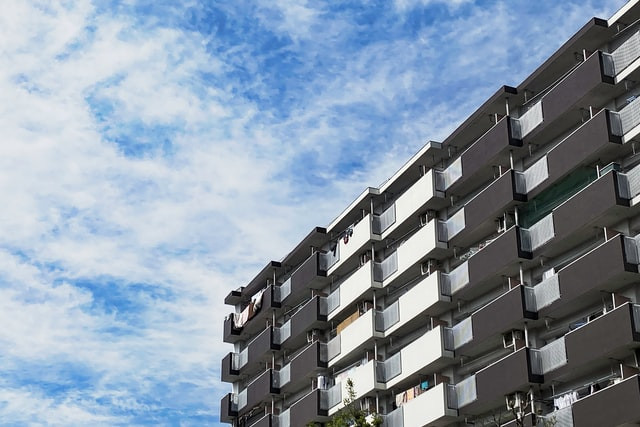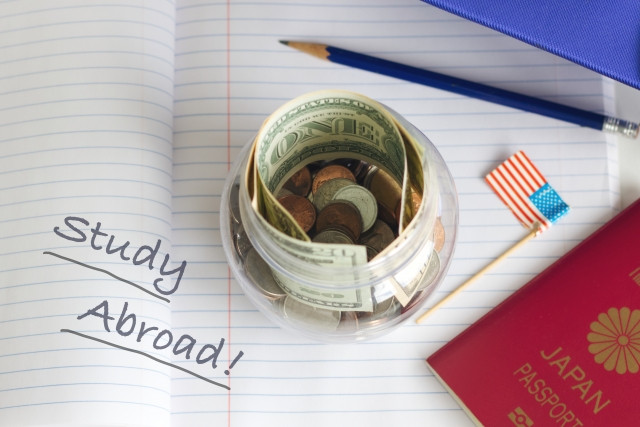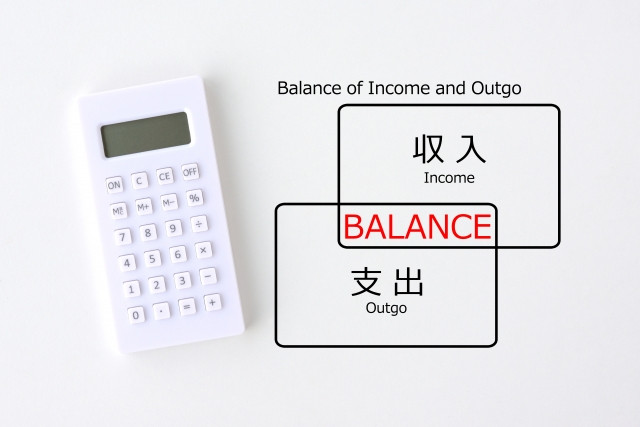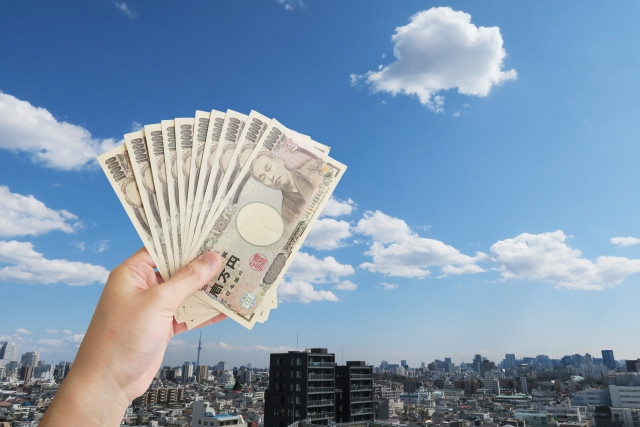Before moving to Japan, whether for study abroad or employment, it is vital to calculate the approximate living cost beforehand. Japan is a country with a high cost of living by global standards. If your income and living costs do not match up, you will face a hard life with financial difficulties.
In this article, we introduce the average living cost for people who live alone in Japan as well as methods to save on living expenses. Refer to this article if you are planning to live in Japan, and budget or make arrangements as necessary.
Table of Contents
- Cost of Living in Japan for a Single Person
- Living Cost in Japan for International Students
- How to Save on Living Costs in Japan
- Is Japan expensive?
- Summary
Cost of Living in Japan for a Single Person

Living costs is called “seikatsu-hi (生活費)” in Japanese. Living costs include many expenses including accommodation rental, utilities, health insurance, food, clothing, transportation, clothing, entertainment, and more.
In Japan, the living costs depend on the area in which you live. For example, if you live in a major city like Tokyo, the living costs are higher due to higher costs for housing and goods. On the other hand, if you live in rural areas such as Kyushu, Shikoku, or Tohoku, you can save a lot on living costs. If you want to reduce your living costs as much as possible, it is recommended to live away from major cities.
The Average Cost of Living in Japan for a Single Person is 155,000 yen

According to the Japan Statistics Bureau’s Family Income and Expenditure Survey, the average expenditure of a one-person household in 2021 is 155,046 yen per month. Living costs include food, utilities, entertainment, etc. costs.
Let us now look at the breakdown.
Food
The average cost of food for a single person in Japan is 38,410 yen. If you eat out more, your food costs will increase further. You can save money by cutting down on food expenses, but don’t overdo it, as you could negatively impact your health due to lack of nutrition. To reduce food expenditure, try simple things, such as avoiding impulse purchases, cooking at home instead of eating out, and buying discounted groceries.
Public Utilities
The average cost of utilities for a single person in Japan is 11,383 yen. The breakdown of public utilities costs are as follows; 3,001 yen for gas, 2,248 yen for water, and 5,482 yen for electricity, keep these averages in mind as a guide. Utility costs vary depending on the season. For example, electricity bills are more expensive in summer and winter because of increased usage of air conditioners. Gas bills also tend to be higher in winter when people take more baths to warm themselves up.
For an in-depth look at public utilities in Japan, check out <Utilities in Japan: How to Set-Up When First Moving In>.
Health Insurance & Medical
The average health insurance medical costs for a single person in Japan is 7,625 yen. Japan has a universal health insurance system that makes it obligatory for those with a certificate of residence in Japan to join. Under Japan’s health insurance system, you will only need to pay 30% of medical expenses out-of-pocket whilst insurance covers 70%. Medical costs are not something you can, or should, save on as health comes first. When reviewing your household budget, aim to reduce expenditure in other categories of spendings.
Clothing

The average cost of clothing for a single person in Japan is 4,606 yen. With fast fashion, you can buy clothes cheaply. Buying some high quality clothing that can last for years also helps you save money in the long run. One way to reduce living costs is to keep clothing and footwear purchases to a minimum, on a need-only basis.
Communication
The average communication costs for a single person in Japan is 7,153 yen. In today’s age of widespread smartphone use, communication costs are an indispensable category of living expenses. It is possible to reduce communication costs by reviewing your plan. Check how much you use and find a plan that suits your needs, there may be cheaper alternatives out there.
For a deeper look at home internet in Japan, check <How Does Home Internet in Japan Work>.
Transport
The average transportation costs for a single person in Japan is 2,950 yen. If you find accommodation near your school or workplace, you can save on transport costs. Additionally, if your regular commute requires public transportation, then getting a commuter pass will be cheaper. You can also save on transport costs by walking or cycling.
Recreation
The average recreation cost for a single person in Japan is 17,106 yen. Recreation expenses are the easiest among the categories of living expenses to save on, so give it a good review when looking for areas you can save money on. Recreation expenses include travel, movie and concert crickets, and monthly fees for subscription-based entertainment or culture lessons. Extreme cutdown of recreation expenses will make life less enjoyable, so do it moderately. Additionally, you can explore recreational activities like exploring parks and visiting free museums that cost little or nothing whatsoever.
※ e-Stat, “家計調査 家計収支編 単身世帯 [2021年]”
Cost of Rent Varies from Region to Region

Rent accounts for a high proportion of living costs in Japan. The average cost for accommodation for a single person in Japan is 22,116 yen. However, since this survey does not distinguish between renters and home-owners, it is not an accurate representation and thus not suitable for reference.
Instead, we refer to the Statistics Bureau of the Japanese Ministry of Internal Affairs and Communications (MIC)’s Housing and Land Survey that is conducted every 5 years. According to the latest 2018 results, the average monthly rent in Japan (nationwide 47 prefectures) is 55,695 yen. For a breakdown of the average monthly rent in each prefecture, and the average monthly rent in major cities, check <Types of Housing in Japan and Cost of Rent>.
※ Statistics Bureau, MIC, “都道府県別でみる住宅状況~住宅及び世帯に関する基本集計(確報値)より~” [2018]
As a guide, if you are renting a flat or apartment room, try to keep your monthly rent cost to less than 1/3 of your monthly income. In major cities, depending on your income, you may not be able to find an apartment that fits your budget. If you want to keep your rent low, try relaxing your house-hunting criteria, such as available facilities and transport links.
Writer's Pick
Living Cost in Japan for International Students

International students who earn less than working class people need to carefully control their living expenses in order to have a stable life. Depending on the circumstances, it may be advisable to consider starting a part-time job or cut into personal savings.
In this part, we briefly introduce the average income and living costs in Japan for international students based on JASSO’s 2019 Privately Financed International Students Survey.
Average Income of International Students in Japan
The average monthly income for all international students in Japan is 148,000 yen. By stage of enrollment (在籍段階別), the highest income is 159,000 yen for preparatory course students, and the lowest income is 136,000 yen for post-graduate level research students. Japanese language school students’ average income is 153,000 yen, and undergraduate students’ 148,000 yen.
The main sources of income for international students in Japan are remittance, part-time jobs, and scholarships. Aside from living expenses, students also need to pay for tuition fees and club fees, so students should be careful how they spend money.
※ JASSO, “令和元年度私費外国人留学生生活実態調査概要” Pg.15-17 [2021.6] [PDF]
Average Expenditure of International Students in Japan

The average monthly expenditure for all international students in Japan is 148,000 yen. By stage of academic enrolment, the highest expenditure is 159,000 yen for preparatory course students, and the lowest expenditure is 136,000 yen for post-graduate level research students. Japanese language school students’ average expenditure is 153,000 yen, and undergraduate students’ 148,000 yen. As can be seen from the average income figures, international students’ income directly translate into expenditure.
The average monthly living cost in Japan for international students is 148,000 yen, which includes 45,000 yen for study and research expenses, and 10,000 yen balance for savings. Excluding those, the average monthly living cost is 93,000 yen. The breakdown of living costs are as follows:
- Housing : 35,000 yen
- Food : 28,000 yen
- Miscellaneous : 9,000 yen
- Utilities : 7,000 yen
- Recreation : 6,000 yen
- School Commute : 5,000 yen
- Health Insurance & Medical : 3,000 yen
The living cost for international students tends to be higher in urban areas and lower in rural areas. For example, the national average housing costs for international students is 35,000 yen, but the average housing costs in Tokyo for international students is 45,000 yen. In addition, commute costs are also higher, as it is sometimes difficult or expensive to rent an apartment or flat close to school; the national average school commute cost is 5,000 yen but 6,000 yen in Tokyo.
As such, the average living cost per month in Tokyo is 166,000 yen, which is 18,000 yen higher than the national average of 148,000 yen, including study and research expenses and balance. Excluding study and research expenses and balance, the average living cost per month in Tokyo is 109,000 yen, which is higher than the national average by 16,000 yen.
In contrast, the living costs per month are lower in Kyushu, Shikoku, Chugoku and Tohoku, where rent is cheaper and it is easier to find accommodation near to school. The average living cost per month in these areas are between 75,000~78,000 yen, excluding study and research expenses and balance.
※ JASSO, “令和元年度私費外国人留学生生活実態調査概要” Pg.21-22 [2021.6] [PDF]
Recommended Reading for International Students
Are you an international student in Japan? Or planning to study in Japan? We recommend reading as much as you can about living costs and how to gain income as a student in our Study in Japan Cost Breakdown: Tuition, Living Cost, Part Time Job article.
Scholarships are one of the main sources of student income. Read about the types of scholarships available in Japan for international students, and how to find them in Study in Japan for Free with Japanese Scholarships.
And last but not least, if you are looking for a part-time job to help support your living in Japan, the top part time jobs for international students in Japan can be found here. Special permission to work called “permission to engage in other activities other than that permitted under status of residence” is required for international students to work for income in Japan, so read up about it here and pay attention to the rules.
How to Save on Living Costs in Japan

If you feel that the living cost is high compared to your income, there are various ways you can save on living costs. You can reduce the costs of rent, utilities, recreation and food for example. Here are some ways to save money on living costs.
Live in a Property with Low Rent
There are many different types of accommodation in Japan, including ones with cheaper rental. Older properties and places further from transport links are usually cheaper, so look around your neighbourhood for a suitable place that can help keep living costs down. The size of the apartment also plays a role, the bigger the room the more expensive. If you are not particular about where you live, try relaxing your house-hunting criteria in favour of cheapness. In addition, living in shared houses or having a roommate can also help greatly reduce your living costs.
However, there are also additional factors to take into account when choosing a place. For example, older properties may be cheaper but the poorer insulation and ventilation may mean higher electricity bills in winter and summer when using air conditioning compared to a newer property. Additionally, moving houses can be expensive so check the costs to move.
Save Water and Electricity
Even small efforts such as turning off the lights when not in use, and turning off the water when soaping or shampooing in the shower can help save money. Since utilities are charged based on usage, it is important to be aware of how much you use and make an effort to use only what you need to reduce the costs.
For electricity bills, replacing old appliances with new ones actually helps save money in the long run. This is because older appliances consume more power which means higher electricity bills. If the air conditioner in your room is old, ask your landlord or management company if they can replace it.
Cook to Reduce Food Costs

Cooking your own food is recommended to save on food costs. Eating out usually costs around 500 to 1,000 yen per meal. If you eat out everyday for breakfast, lunch and dinner, you will need to spend at least 45,000 yen a month on food.
On the other hand, if you buy ingredients from the supermarket and cook yourself and prepare a lunch box, you can keep your food costs as low as 20,000 yen a month, that’s around half the price of eating out all day everyday. Targeting special sale items and discounts is also an effective way to reduce food costs.
Switching to a Cheaper Phone Plan
If you have a contract with a major internet carrier, you can save communication costs by switching to a different carrier that offers cheaper plans. It is possible to reduce your monthly phone bill to 1,000 yen or less. There are many plans, some with package deals offering internet plans too, so check if you are interested.
Reduce Wasteful Spending

Impulse purchases are our greatest enemy when it comes to keeping living costs low. You can reduce your spending by cutting down on expenses that you can live without, such as games, clothes that aren’t worn frequently, and fancy dining.
It is advisable to keep a record of your income and expenditure to check whether you are spending too much. A good idea is to set aside a fixed amount of money to spend freely on hobbies and recreation so you do not accidentally overspend.
Is Japan expensive?

It depends on many factors. The living cost per month in Japan is higher compared to other countries, and among the highest in Asia. Those coming to Japan from countries such as Indonesia, Myanmar and Vietnam will be surprised at the high cost of living. However, if you live near or in a major city in a developed country, you may find the living cost to be lower in Japan. If the living cost in Japanese yen is difficult to comprehend, try converting to your own currency.
Summary

The average living cost in Japan is approximately 150,000 yen per month. The cost of living is higher in urban areas compared to rural areas. In the case of international students, tuition fees and textbook fees are also expenses to be paid alongside living costs. The recommended income to rental ratio is 3:1. If you find your living costs to be too high, there are ways you can work on to reduce them.






















.jpg)












